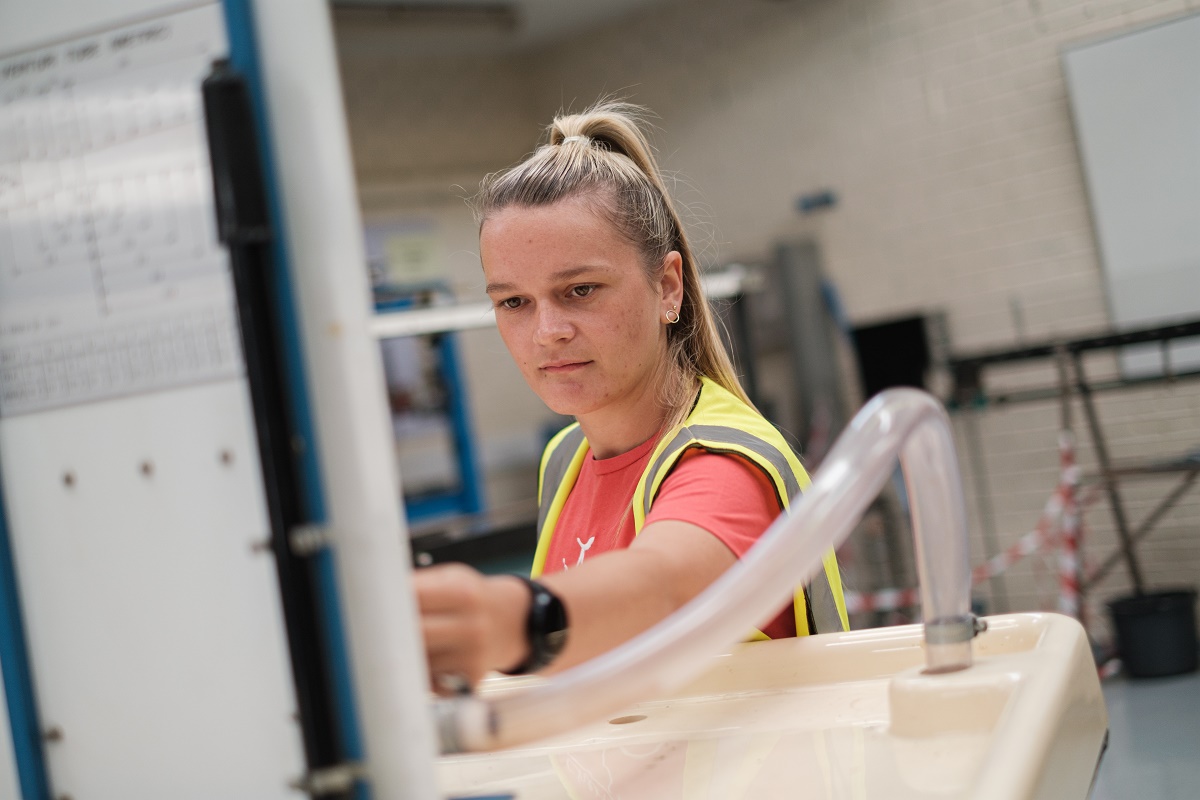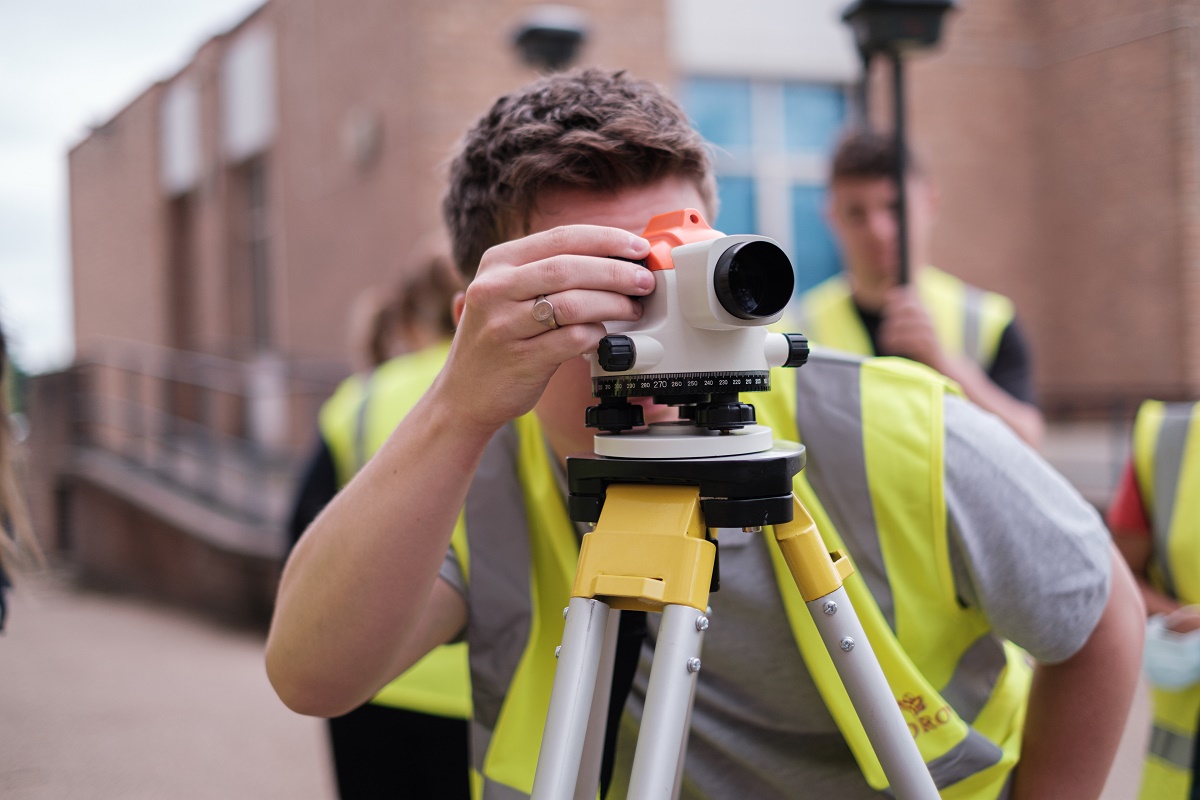BSc (Hons) Quantity Surveying (Degree Apprenticeship)

Course details
Year of entry
2026
Duration
4YRS (PT)
UCAS Tariff
48-72
Institution Code
G53
Location
Wrexham
Why choose this course?
The BSc (Hons) Quantity Surveying Degree Apprenticeship is an ideal qualification for those who are employed in the industry and are motivated by seeing their hard work rewarded and their expertise recognised within a vibrant and challenging construction sector.
This course:
- Sets you up for a career in the construction industry, one of the largest employment sectors in the United Kingdom.
- will extend your knowledge and reinforce your understanding of how financial cost is measured, controlled, authorised and accounted for in the management of building and infrastructure projects.
- Equips you with knowledge of the financial management of new builds and heritage and refurbishment projects; often sensitive in nature because of historical or architectural significance, or the traditional quality of the existing fabric.
Key course features
- Joint programme delivery with Coleg Cambria (Year 1 and 2) and Wrexham University (Year 3 and 4) (Work based Learning Year 1 and 2).
- On campus class-based learning lectures and laboratories are primarily one day a week or block delivery (Subject to employer demand).
- When Degree Apprenticeship students are concurrently or subsequently enrolled on the Chartered Institute of Building (CIOB) Professional Development Programme (PDP), successful completion of both Degree Apprentice and the PDP will allow Charted membership of the CIOB (MCIOB).
- Peer learning with your fellow degree apprentices working in different companies and industries in the built environment support symbiotic collaborative learning.
- Wide-ranging industry-standard digital resources available for use on- and off-campus.
- A variety of teaching and learning methods are used to ensure that technical content is applied to typical quantity surveying scenarios, utilising industry case studies, live sites and assessment briefs.
- The curriculum aims to provide learning current and future Built Environment practices, in particular supporting apprentices in delivering sustainable and society responsible solutions, for example carbon neutral and renewable energy to benefit all of society.
What you will study
YEAR 1 (LEVEL 4)
The first year of the BSc (Hons) Quantity Surveying Degree Apprenticeship programme comprises six core modules and one optional module that combine to provide an informed introduction to the financial management of building and infrastructure projects.
MODULES
- Quantity Surveying (Core)
- Digital Technologies in Drawing and Modelling (Core)
- Legal Principles, Compliance and Liability (Core)
- Science and Materials (Core)
- Construction Technology (Core)
- Work-based Learning 1 (Core)
One of:
- Architectural Design Technology (Optional)
- Civil Engineering Design (Optional)
- Construction Management (Optional)
- Building Surveying (Optional)
YEAR 2 (LEVEL 4 & 5)
The second year of the Quantity Surveying course builds upon the first through modules that explore important technical and procedural considerations in the practice of quantity surveying. Modern Methods of Construction considers opportunities for prefabrication and the use of modular construction systems, and Commercial Management addresses financial considerations and costs associated with the design, procurement, construction, completion, maintenance and decommissioning of buildings.
MODULES
- Digital Technologies in Surveying (Core)
- Quantity Surveying 2 (Core)
- Modern Methods of Construction (Core)
- Commercial Management (Core)
- Work-based Learning 2 (Core)
YEAR 3 (LEVEL 5 & 6)
The third year of the programme provides opportunities to better understand the implications of, and mitigations against, the effects of climate change in Design for Climate Resilience, and Project Management considers the principles and practices that lead to the successful implementation of refurbishment and new-build development projects.
MODULES
- Building Services (Core)
- Procurement and Contract Practice (Core)
- Project Management (Core)
- Design for Climate Resilience (Core)
YEAR 4 (LEVEL 6)
The fourth and final year of the programme completes the Degree Apprenticeship by incorporating elective elements where apprentices are able to identify and pursue an appropriate research proposal in Individual Research Project, and complete a Major Project, the parameters and work-based context of which is determined between the Apprentice, their employer and the Module Tutor.
MODULES
- Individual Research Project
- Professional Practice
- Major Project
The information listed in this section is an overview of the academic content of the programme that will take the form of either core or option modules. Modules are designated as core or option in accordance with professional body requirements and internal academic framework review, so may be subject to change.
Entry requirements & applying
To enrol on the BSc (Hons) Quantity Surveying Degree Apprenticeship programme, applicants must:
- be in full-time employment in a job role appropriate to quantity surveying,
- work in Wales at least 51% of the time,
- be able to attend one day a week for studies,
- meet the respective entry requirements identified below, and
- not have previously studied a similar subject at this level or higher.
Applicants will normally be expected to satisfy one or more of the following academic and/or professional criteria as a minimum:
- Successful completion of a Foundation Year at Level 3 in a discipline considered appropriate by the Programme Team; or
- 48-72 UCAS tariff points; or
- a BTEC National Certificate or Diploma; or
- membership of a construction-related professional body at a level deemed appropriate by the programme team.
Applications from candidates who do not satisfy the standard entry criteria identified above are welcome and will be expected to demonstrate through interview that they have the potential to succeed on the programme.
Candidates who are employed within the construction industry and have sufficient appropriate experience are also welcome, though diagnostic assessment prior to admission will be considered in order to measure academic capability, particularly in mathematics and English or Welsh.
International applicants whose existing qualifications are outlined by the National Academic Recognition and Information Centre (NARIC) as being equivalent to the relevant UK entry qualification are also welcome. All applicants whose first language is not English or Welsh will be expected to demonstrate English language proficiency; European applicants are able to provide this evidence in a number of ways (further details), including IELTS; International applicants require a UKVI Approved Secure English Language Test (SELT) (further details).
Teaching & Assessment
Modules are delivered using a variety of teaching and learning techniques, including traditional lectures, practical ‘hands-on’ activities, tutorials and group discussions, laboratory work, construction site-based observation and peer appraisal. The main priority is to ensure that you feel comfortable within the academic learning environment and feel able to contribute to the discussion of subject matter within any class, tutorial or other learning activity that forms part of your studies – teaching and learning is fundamentally a two-way process within which your opinion is vitally important.
A range of assessment methods are used within the programme to simulate the sorts of written, practical, visual and oral communication skills that are expected of quantity surveyors; written reports, the practical use of technical equipment, visual presentations, laboratory analyses, in-class tests, examinations, coursework and oral presentations are all important ways in which you can demonstrate your understanding. The types of assessment selected for each module have been chosen to best-suit the nature of the technical content in each subject, and collectively provide a range of opportunities for you to demonstrate your interest, enthusiasm and interpretation of content during your studies.
In terms of particular assessment needs, the University’s Inclusion Services department can provide appropriate guidance and support should any apprentices require reasonable adjustments to be made to assessment processes because of a recognised prevailing disability, medical condition, or specific learning difference.
Career prospects
The BSc (Hons) Quantity Surveying Degree Apprenticeship provides a qualification that is recognised as a comprehensive, informed and valuable measure of the ability of the Wrexham University graduate in the financial management of building and infrastructure projects.
Opportunities for quantity surveyors exist within the construction industry in many varied contexts, from recent developments to heritage and refurbishment projects of all scales and types – developing a career as a quantity surveyor can therefore lead to many rewarding experiences, not least due to the fact that no two building projects are the same, and that quantity surveyors are likely to spend as much time on site as they are at their desks.
These circumstances mean that a career in quantity surveying can often be challenging, particularly rewarding, but never routine.
The BSc (Hons) Quantity Surveying Degree Apprenticeship qualification will therefore provide a sound basis upon which to develop a career in the financial management of development projects in a range of contexts.
Graduates can expect to establish themselves as quantity surveyors, building finance consultants and project managers, not least because of the experience and understanding that can be gained by following the BSc (Hons) Quantity Surveying Degree Apprenticeship programme at Wrexham University.
Fees & funding
Subject to satisfying both Degree Apprenticeship eligibility criteria in the Welsh context and Wrexham University entry requirements, the BSc (Hons) Quantity Surveying Degree Apprenticeship programme is fully-funded by Welsh Government, subject to availability.
Accommodation
At Wrexham University, we offer on-campus en-suite rooms within our Wrexham Student Village. These private, fully furnished spaces are conveniently located, providing easy access to campus facilities, study areas, and social spaces. Plus, you’re just a 10-minute walk from the city centre!
With all bills included, free Wi-Fi, 24/7 security, and large social areas, you’ll find everything you need for a great student experience.
Explore our student accommodation options to find your perfect home away from home.
Apply Now
Individual Applicants
If you're applying for a Degree Apprenticeship as an individual, please complete our online application form.
Employers
If you're an employer looking to reserve a place for a future apprentice or would like more information about the Degree Apprenticeship on behalf of an employee, please contact us at apprenticeships@wrexham.ac.uk.
Upcoming Open Days.
Join us at an upcoming open day to meet your lecturers, find out more about our courses, discover our facilities and get a taste of student life.
Browse all of our open days & events.




